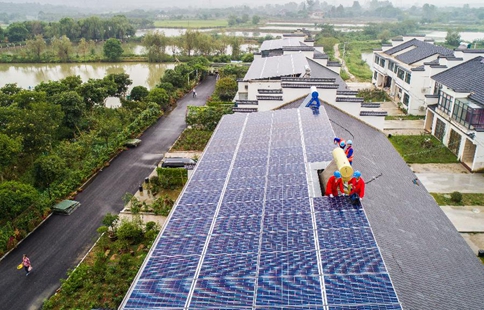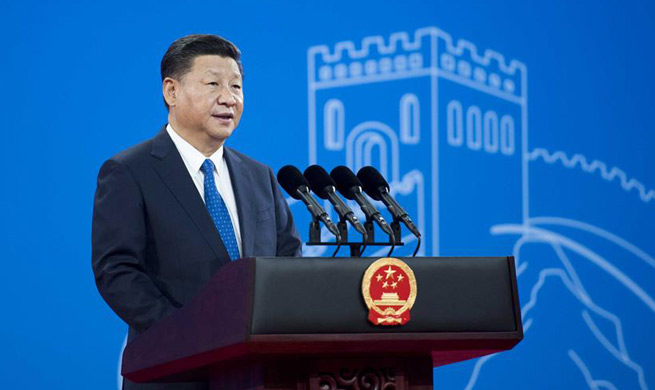By Xinhua writers Liu Wei, Wang Minghao, Feng Changyong
BEIJING, Sept. 27 (Xinhua) -- Hou Rong wept with happiness when she heard that China Tuesday unveiled the overall plan for establishing its national park system and the Giant Panda National Park spanning three provinces is to be created by 2020.
After studying and protecting giant pandas for two decades, she learned the proposed park will unite pandas isolated on six mountains in Gansu, Shaanxi and Sichuan provinces, helping the endangered animals mingle and enrich their gene pool.
"Many years of conservation have paid off. Their numbers in the wild rose by 17 percent between 2003 and 2013. That's why the International Union for Conservation of Nature (ICUN) reclassified the giant panda in 2016 from endangered to vulnerable," said Hou, director of the research center of Chengdu Research Base of Giant Panda Breeding.
However, like many endangered species, pandas still suffer habitat loss and fragmentation due to natural disasters, climate change and human activity.
Some sub-populations number is fewer than 10. This makes them vulnerable to disease and reproductive problems, and less able to adapt to a changing environment.
Multiple administrations in the three provinces worsen the situation. When a panda crosses a provincial boundary, jurisdiction becomes blurred.
Following a pilot scheme begun earlier this year, the park will cover 27,134 square kilometers, three times the area of the United States' Yellowstone National Park. It will have four major zones: a core protection area; an ecological restoration area; a tourist and education area; and a breeding center. It will protect pandas in 67 current reserves as well as another 8,000 endangered animals and plants.
China started captive-breeding programs in the late 1990s and a reintroduction program in 2003, which proved effective in keeping the species on the map.
"But increasing the wild population requires a large protection area and an upgraded ecosystem. The park will do the job," said Hou.
China is creating the national park system over several years. At the end of 2015, a leading group on reform decided up to nine such facilities should be included in the system, including two parks to protect rivers.
Over six decades of nature protection, China has established 2,740 nature reserves, covering 14.8 percent of its territory, but insufficient funding and a lack of a unified plan and protection ability rendered many reserves ecologically unviable.
"The national park system will alter such sporadic protection and usher in a new established nature protection scheme," said Cui Guofa, professor of the School of Nature Conservation of Beijing Forestry University.
While the parks paint a wonderful picture for the conservation of wildlife and the restoration of the ecological system, they also face challenges - the conflict between protection and development being the most pressing.
Nangou Village, Hunchun City in the northeastern Jilin Province, is near a Manchurian tiger habitat and is included in the proposed Northeast Tiger and Leopard National Park.
At least two villagers were attacked by tigers in 2016, so when it' s time to harvest mushrooms and wild vegetables, they avoid the hills.
Yin Zhaohai runs a cattle farm near the village. Since May, tigers have killed six of his cattle and another 20 have disappeared.
"Tigers are endangered animals, but cattle and humans also need to be safe," said Yin.
Conflict is inevitable. When tigers attack humans or their cattle, the local set traps for them.
"Harmonious coexistence between people and wild tigers and leopards, and development that values both ecological protection and economic growth are a big challenge for the local government," said Li Zhixing, secretary-general of Hunchun-based Tianhe Manchurian Tiger Protection Association.
Jilin Province has offered compensation for those who suffer injury or property damage since 2006. This alleviates conflict and strengthens protection.
In 2008, with the help of two international conservation associations, Hunchun Manchurian Tiger National Nature Reserve began a new plan that established cattle breeding and beekeeping cooperatives for villagers without charge.
Villagers' incomes have risen and they now patrol to protect wild tigers and leopards. They regularly remove traps in the nearby mountains and report poaching and traces of the animals.
"We are familiar with the mountain environment and wild tigers' habits and we are earning more by raising cattle on the cooperatives. We won't harm tigers," said one villager.
The creation of national parks will lead to the relocation of many people. For example, at least 170,000 people in Sichuan will have to move so that pandas will be able to roam freely between far-flung habitats.
Qubie Mazi of Yi ethnic group has lived in Sichuan's Shanfeng Village for 40 years, earning a living by growing potatoes and collecting herbs. A panda reserve in the village is a key corridor connecting populations in Liangshan Mountain.
Poverty once drove the villagers to poach pandas, but after a penalty and bonus system was introduced, they learned to value them.
Asked how he feels about making way for pandas, Qubie Mazi said, "I will move if I get a new home and a new job."
Hou Rong said people should be taught to protect the environment. "People can live outside the core protection area and find jobs in the park such as guides. They won't risk poaching wild animals once they have a decent job and steady income."
(Zou Shengwen and Zong Wei also contributed to the story.)
















